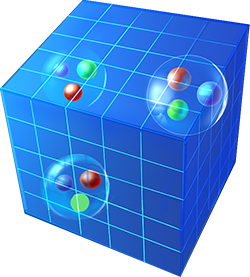Utilizing Large-scale
Computations to Explore
the Fundamental Laws of
Elementary Particles
News
2025.6.3: 客員研究員の富谷昭夫さんが、2025年度HPCIソフトウェア賞を受賞しました (外部リンク)。
2024.10.18: Xiaoang Wang特別研究員が2024年10月1日付けでチームに加わりました。
2024.03.29: Antonin Portelli さんが、エジンバラ大学からの訪問研究員として滞在しています (2024.3-2024.9)
2024.03.29: 辻龍太郎さんが、東北大学総長賞を受賞しました (R-CCS広報ページ, external link)
2024.03.21: 辻龍太郎さんが、東北大学宇宙創生物理学国際共同大学院の Exellent Student Award (Theory) と Special Award を受賞しました (外部リンク)
セミナー・ワークショップ
 Inferring theoretical predictions from the Standard Model (SM) of elementary particles, which explains most of the existing experimental and observational results of particle physics, often require numerical computation procedures to solve Quantum Chromo Dynamics (QCD) comprised in the SM. These include the predictions of the behavior of particle systems in extreme conditions such as high temperature and/or density, and precision tests of the SM using hadronic reactions as well as investigation of physics beyond the SM.
Inferring theoretical predictions from the Standard Model (SM) of elementary particles, which explains most of the existing experimental and observational results of particle physics, often require numerical computation procedures to solve Quantum Chromo Dynamics (QCD) comprised in the SM. These include the predictions of the behavior of particle systems in extreme conditions such as high temperature and/or density, and precision tests of the SM using hadronic reactions as well as investigation of physics beyond the SM.
Numerical simulations with lattice QCD techniques using a realistic set of parameters are becoming feasible. However, many significant questions remain unsolved, which we are addressing by employing lattice methods while preserving as many important symmetries as possible—the symmetries often sacrificed to make the simulations less demanding. In order to use supercomputer Fugaku for such demanding computations, we will develop algorithms, analysis methods, and codes, while performing computation on existing HPC resources. In the first principle computations of the models, we aim to bridge the energy scale layers, and thereby reveal the nature of the evolution of the universe and the mechanism of matter creation in it.